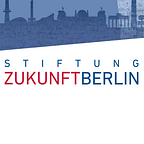What is the Meaning of Local Democracy?
by Cornelia Poczka
Introduction
Under Germany’s Grundgesetz or “Basic Law”, the Federal Republic of Germany is a democratic and social state in which all state authority is derived from the people. But it is not only in Berlin that fewer and fewer people are convinced that this is really the case. According to a nationwide survey conducted in 2017, only 49 percent of the population believe that their opinion counts. Among poorer people, the proportion, at around 60 percent, is even well above the average. Many people — especially those who do not have German citizenship, but who grew up here or have been living here for many years — feel that they are not sufficiently involved in decision-making processes, above all, on the local level. At the same time, civic engagement in initiatives and projects is growing in Berlin. Berlin society increasingly wants to take responsibility for its lived environment and to help to shape it, but suitable formats for ensuring true co-determination are lacking thus far.
In accordance with Article 20, Paragraph 3 of the Basic Law, state authority is “exercised by the people through elections and other votes”. What is meant by this are elections of persons (representative democracy) or also decisions taken by way of referendums (co-decision-making on particular issues — direct democracy). Representative democracy constitutes the basic building block of our democracy, but it does not yet create paths toward the concrete co-responsibility of the demos. Direct democracy only allows for a yes or a no, which is also not always conducive to the common good.
Requirements for a New Culture of Participation: A Culture of Co-Responsibility
Both in Germany and abroad, numerous approaches for getting the population more involved in projects on the local level already exist; nonetheless, there are still very different ideas about the forms, procedures and scope of civil participation in urban or regional projects. Some are successful. Others have shown that the chosen format is not helpful.
In Germany, for example, government and administration are still presenting their own, nearly finished conceptions, which can hardly be changed anymore, in processes of civil participation. This is contributing to growing disenchantment with politics among the population.
To bring about a paradigm shift in this regard, political authorities have to recognise the competencies of citizens and be willing to share responsibility. The population has also to learn that co-responsibility is always about the common good and not one’s own priorities. For this new culture of participation to become the norm, however, far-reaching democratic structural reforms are necessary and legal arrangements and clear guidelines for implementation are required.
The new culture of participation should only apply for those cases in which there is a realistic chance that the population can help shape and decide (otherwise the disappointment is too great). If the co-responsibility of residents is a realistic option, the latter should be involved, along with representatives of government, administration and business, in an open process of participation in which they together elaborate and implement strategies for the sustainable development of their city, neighbourhood or region in the interest of the common good — and they should be involved in such a process from the start and on equal terms.
Berlin: The Berlin Forum
In the Berlin Forum, the Stiftung Zukunft Berlin is working together with a number of partner organisations to give urban society, including underrepresented or unheard groups, a voice on a variety of issues. The Berlin Forum was launched in 2019. Its basis consists of 50 committed people, who come from all parts and sectors of Berlin and who bring the perspectives and concerns of the city into frequently-meeting working groups and four plenary sessions (which are currently conducted via video conference) per year. The goal of the Berlin Forum is to bring together government and administration with urban society and civic initiatives in a new format.
The Berlin Forum promotes a more broadly conceived notion of local democracy than what is usually described and has already accomplished crucial preliminary work in its working groups and events since 2019. Its objective is to bring about a participative culture of sustainability and involvement in processes of shaping the lived environment in the city and the region.
Local democracy thus means the possibility for residents to participate in shaping their environment. This does not only require rethinking on the part of government and administration, but we also have all to stop putting the focus on our own interests. In order to be able to involve underrepresented and unheard groups, moreover, there need to be participation formats with low barriers to access for those who, for various reasons, have not been able to take part thus far.
Cornelia Poczka grew up in North Africa, French schooling, studied English and French linguistics in Berlin and Brighton, leading functions in different departments of the Berlin Senat (the executive branch of the municipal government), from 1989 on, among other things, responsible for European and international affairs in the Department of Urban Development. Since 2015, volunteer work in the Berlin Forum: above all, in the “Cohesion” and “Our Common Project, the City” working groups, as well as on the topic of local democratic practice as part of Europe Bottom-Up.
